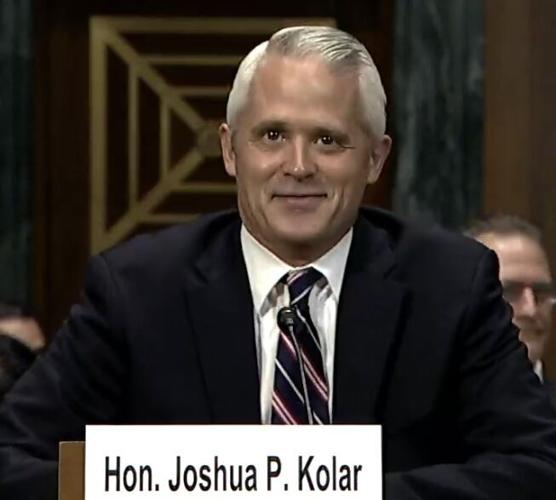
U.S. Seventh Circuit Court of Appeals Judge Joshua P. Kolar
CHICAGO - A federal appeals court says Illinois residents have a right to carry guns to defend themselves, but that right ends the moment they step foot in a train station, onto a bus or any other mode of public transportation.
On Sept. 2, a three-judge panel of the U.S. Seventh Circuit Court of Appeals sided with the state of Illinois, Cook County and Chicago's public transit agencies, overturning a lower court's ruling that an Illinois state law prohibiting people from carrying firearms on trains, buses and other kinds of public transit violated people's Second Amendment rights.
The decision was authored by Seventh Circuit Judge Joshua P. Kolar, an appointee of former President Joe Biden. Kolar was joined in the decision by Seventh Circuit judges Amy J. St. Eve, who was appointed during the first term of President Donald Trump, and Kenneth F. Ripple, an appointee of former President Ronald Reagan.
In the ruling, the judges said Illinois is allowed to ban people from carrying loaded, unsecured weapons on trains and buses and in stations, bus stops and "adjacent parking areas," because firearms are particularly dangerous in such crowded and confined public environments.
"... We must not lose sight of the modern target of Illinois’s public transit firearm restriction: systems comprised of metal tubes traveling quickly, carrying hundreds of passengers at a time, and relied upon by millions for their basic transportation," Kolar wrote for the court. "The Founding and Reconstruction generations had no corollaries for a space where bullets will ricochet and kill innocents and first responders during a shooting, where the very nature of the space facilitates a quick escape by criminals, or where a terror attack could paralyze free movement throughout a city."
The decision did not address concerns raised by Second Amendment rights advocates that disarmed citizens inside those trains and buses could be relatively easy victims of criminals or terrorists, who likely would not respect the carry ban on public transportation, and could take advantage of the very conditions cited by the judges to commit violent crimes or acts of terror without fear of meeting immediate armed resistance.
In the ruling, the judges further said they believed the state could constitutionally prohibit people from carrying guns on trains and buses and on public transit property, in part, because the vehicles and associated property are owned and operated by the government.
Anyone who doesn't wish to "temporarily" surrender their Second Amendment rights at the train station door or while waiting at a bus stop are free to not use public transportation, the judges said.
"It is entirely possible to avoid (the Illinois public transportation carry ban,) as Plaintiffs currently do," the judges said. "And, when an individual decides the benefit of using public transit outweighs the burden on his right to carry, the trade-off is temporary."
The Seventh Circuit ruling overturned the decision of U.S. District Judge Iain D. Johnston, who had said he believed the Illinois carry ban likely violated the Second Amendment under the U.S. Supreme Court's recent landmark holdings, including New York State Rifle and Pistol Association v Bruen.
When taken together with the prior landmark Second Amendment decision in District of Columbia v Heller, the Bruen ruling created tests for states and courts to use when evaluating if such restrictions are constitutional. Those tests require courts and lawmakers to evaluate if the weapons being banned are both dangerous and unusual, and if the restrictions are in keeping with U.S. history and tradition dating back to the ratification of the Second Amendment in 1791 and the Fourteenth Amendment in 1868.
The legal challenge dates to 2022, when attorney David Sigale, of Wheaton, filed suit in Rockford federal court on behalf of plaintiffs Benjamin Schoenthal, Mark Wroblewski, Joseph Vesel and Douglas Winston.
The lawsuit was supported by the non-profit Second Amendment rights advocacy organization, the Firearms Policy Coalition.

Attorney David Sigale
All of the plaintiffs are Illinois residents who claim they desire to carry concealed firearms on Metra trains and Chicago Transit Authority trains and buses in and around Chicago for self defense. But they said they fear being arrested and prosecuted by Illinois law enforcement under the Firearm Concealed Carry Act, a state law that generally bans people from carrying guns on trains, buses and other forms of public transit and at transit stations and on property held by transit agencies in Chicago and elsewhere in the state.
Under the law, concealed carry permit holders are allowed to transport their weapons on trains and buses, but only if they are secured in a locked container and unloaded.
Illinois Attorney General Kwame Raoul and Cook County's state's attorneys have argued the transit carry ban is needed to promote public safety.
However, the lawsuit arrived against a backdrop of years of surging crime in Chicago and elsewhere, including on public transportation. Such crimes have included armed robberies, shootings and murder.
On Sept. 2, 2024, for instance, four people were shot and killed on a CTA Blue Line train near suburban Forest Park.
In his ruling, Johnston specifically rejected the so-called "government proprietor" argument advanced by Cook County, which said the government should be free to restrict firearms and concealed carry on any property owned by government.
And the federal judge rejected the attempt by the state and Cook County to assert that public transit carry should be banned under the so-called "sensitive places" exclusions, because public transit is particularly crowded and therefore a "sensitive place."
On appeal, the Seventh Circuit judges mostly rejected Johnston's reasoning, but stopped short of entirely signing off on the state's and Cook County's request for essentially permission to ban firearms any place they deem "sensitive."
In the ruling, the Seventh Circuit judges said the Illinois law doesn't run afoul of the historical tests established by Heller and Bruen.
They asserted the law holds up, in part, because in the 19th Century, some communities prohibited people from carrying in certain crowded and confined social situations, such as in public ballrooms, without apparent constitutional problems.
The judges made much of the fact that those regulations apparently required firearm owners to completely surrender their gun, temporarily, while in those ballrooms or other crowded public venues.
Under the Illinois law, they note, gun owners don't need to surrender their firearms entirely. Rather, they must carry it, disassembled and unloaded, in a locked secure case while using a train or bus. When they arrive at their destination and return to the public street, they are then free to remove the weapon from the case, reassemble it and load it for use in defense.
The judges asserted these regulations don't violate people's rights to self defense under the Second Amendment.
The judges did not say what they believed such gun owners should do if they are confronted by a criminal or other threat to their safety or others while on public transportation.
In the ruling, the judges further noted that the federal government has for decades forbidden people from carrying weapons onto airplanes, unless they are similarly disassembled, secured and unloaded.
And they said governments have also long forbidden people from carrying loaded firearms into legislative buildings, courthouses and other kinds of government buildings.
The judges noted that such buildings and aircraft are also subject to heightened security screenings and protected by armed police, air marshals, guards and other kinds of security personnel.
But they said public transit, which includes no such additional protections, can still be treated the same by the state, without violating people's Second Amendment rights to armed self defense."
The judges attempted to maintain a thin line, however, between the reasoning upholding the transit carry ban and an attempt by the state or city of Chicago, for instance, to declare all "crowded" spaces to be "sensitive" and subject to carry bans.
They said, for instance, that government can't ban people from carrying in Chicago's Loop business district.
"The Second Amendment equally grants the right to bear arms to those who live in high density urban areas and those in rural communities," Kolar wrote.
Essentially, they said, what separates the transit carry ban from more general and unconstitutional bars on concealed carry is the "kind of place" in which they are banned.
The judges said they would "save for another day" more discussion on what other "kinds of places" could be included on the growing list of "sensitive places" in which a growing number of U.S. courts have found the Second Amendment may be limited.
"The Second Amendment protects an individual’s right to self-defense," Kolar wrote for the court. "It does not bar the people’s representatives from enacting laws - consistent with our nation’s historical tradition of regulation - that ensure public transportation systems remain free from accessible firearms.
"We are asked whether the state may temporarily disarm its citizens as they travel in crowded and confined metal tubes unlike anything the Founders envisioned. We draw from the lessons of our nation’s historical regulatory traditions and find no Second Amendment violation in such a regulation."






